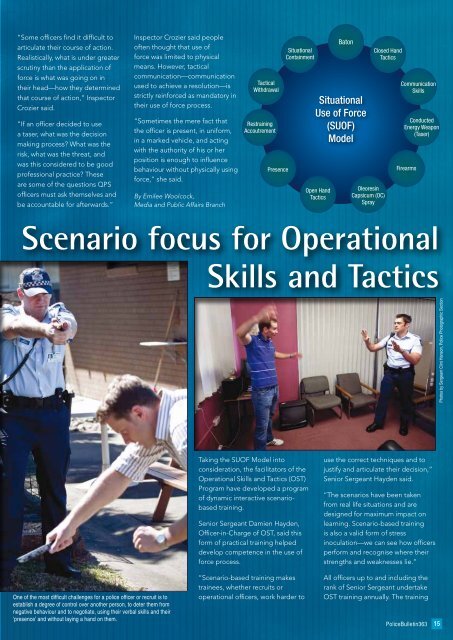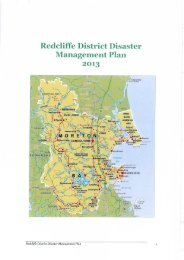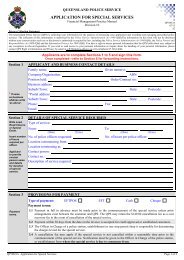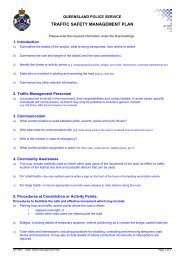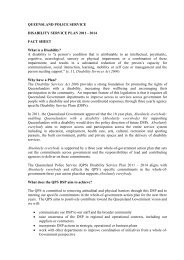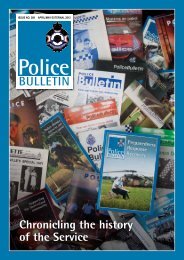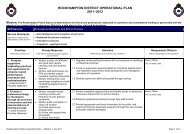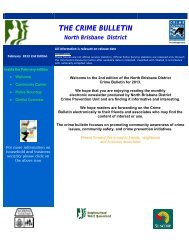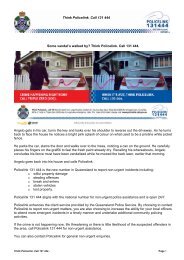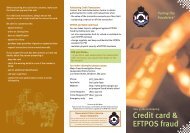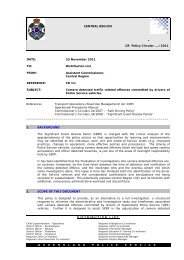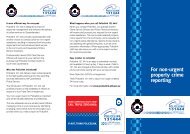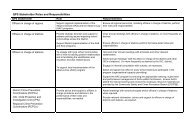Training Command - Queensland Police Service - Queensland ...
Training Command - Queensland Police Service - Queensland ...
Training Command - Queensland Police Service - Queensland ...
You also want an ePaper? Increase the reach of your titles
YUMPU automatically turns print PDFs into web optimized ePapers that Google loves.
“Some officers find it difficult to<br />
articulate their course of action.<br />
Realistically, what is under greater<br />
scrutiny than the application of<br />
force is what was going on in<br />
their head—how they determined<br />
that course of action,” Inspector<br />
Crozier said.<br />
“If an officer decided to use<br />
a taser, what was the decision<br />
making process? What was the<br />
risk, what was the threat, and<br />
was this considered to be good<br />
professional practice? These<br />
are some of the questions QPS<br />
officers must ask themselves and<br />
be accountable for afterwards.”<br />
Inspector Crozier said people<br />
often thought that use of<br />
force was limited to physical<br />
means. However, tactical<br />
communication—communication<br />
used to achieve a resolution—is<br />
strictly reinforced as mandatory in<br />
their use of force process.<br />
“Sometimes the mere fact that<br />
the officer is present, in uniform,<br />
in a marked vehicle, and acting<br />
with the authority of his or her<br />
position is enough to influence<br />
behaviour without physically using<br />
force,” she said.<br />
By Emilee Woolcock,<br />
Media and Public Affairs Branch<br />
Tactical<br />
Withdrawal<br />
Restraining<br />
Accoutrement<br />
Presence<br />
Situational<br />
Containment<br />
Baton<br />
Situational<br />
Use of Force<br />
(SUOF)<br />
Model<br />
Open Hand<br />
Tactics<br />
Oleoresin<br />
Capsicum (OC)<br />
Spray<br />
Closed Hand<br />
Tactics<br />
Communication<br />
Skills<br />
Conducted<br />
Energy Weapon<br />
(Taser)<br />
Firearms<br />
Scenario focus for Operational<br />
Skills and Tactics<br />
Photos by Sergeant Clint Hanson, <strong>Police</strong> Photographic Section<br />
One of the most difficult challenges for a police officer or recruit is to<br />
establish a degree of control over another person, to deter them from<br />
negative behaviour and to negotiate, using their verbal skills and their<br />
‘presence’ and without laying a hand on them.<br />
Taking the SUOF Model into<br />
consideration, the facilitators of the<br />
Operational Skills and Tactics (OST)<br />
Program have developed a program<br />
of dynamic interactive scenariobased<br />
training.<br />
Senior Sergeant Damien Hayden,<br />
Officer-in-Charge of OST, said this<br />
form of practical training helped<br />
develop competence in the use of<br />
force process.<br />
“Scenario-based training makes<br />
trainees, whether recruits or<br />
operational officers, work harder to<br />
use the correct techniques and to<br />
justify and articulate their decision,”<br />
Senior Sergeant Hayden said.<br />
“The scenarios have been taken<br />
from real life situations and are<br />
designed for maximum impact on<br />
learning. Scenario-based training<br />
is also a valid form of stress<br />
inoculation—we can see how officers<br />
perform and recognise where their<br />
strengths and weaknesses lie.”<br />
All officers up to and including the<br />
rank of Senior Sergeant undertake<br />
OST training annually. The training<br />
<strong>Police</strong>Bulletin363 15


